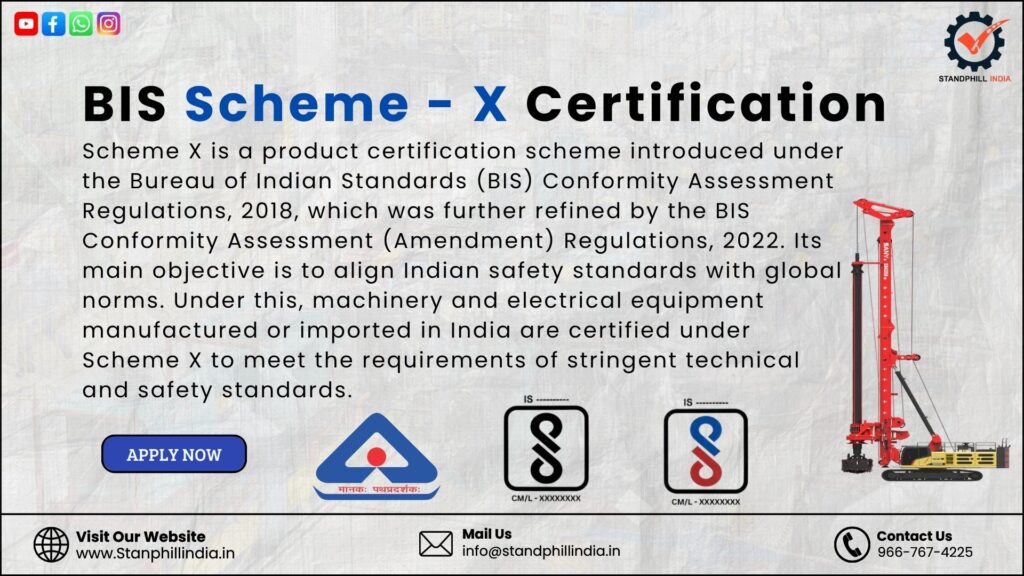As India’s manufacturing sector scales new heights, ensuring product safety and regulatory compliance is becoming a central pillar for both domestic and global competitiveness. One of the most impactful developments in this direction is the introduction of BIS Scheme X Certification, a mandatory framework launched by the Bureau of Indian Standards (BIS).
This scheme is designed to regulate the quality and safety of a wide range of industrial machinery and electrical equipment that had previously operated outside formal certification requirements. For companies like Standphill India, aligning with this standard is not just a legal necessity—it’s a strategic move that can unlock access to high-value markets and contracts.
If you’re involved in the manufacturing, supply, or import of electrical control equipment, motors, or machinery, understanding this scheme is critical. Let’s explore what BIS Scheme X Certification involves, who it applies to, and how to get certified.
What Is BIS Scheme X Certification?
BIS Scheme X Certification is a new product compliance requirement under the Indian Standards framework, introduced in 2022. It mandates that specific categories of electrical equipment and industrial machinery be certified to Indian safety standards before being sold or imported into India.
Unlike other BIS schemes (such as CRS for electronics or Scheme I for commodities), Scheme X focuses on equipment that involves operational hazards, mechanical stress, and potential safety risks in industrial or infrastructure environments.
Products currently falling under Scheme X include:
-
Low-voltage switchgear and controlgear (circuit breakers, switches, contactors)
-
Electrical motors and motor starters
-
Industrial pumps and compressors
-
Cranes, hoists, and lifting devices
-
Machinery sub-assemblies and panels
The aim is to reduce safety risks, prevent accidents, and ensure consistent product quality in India’s rapidly expanding industrial landscape.
To dive deeper, visit our dedicated blog article on BIS Scheme X Certification, where we break down the categories and applicable standards.
Why It’s Important for Manufacturers
1. Legal Compliance
Once BIS enforces Scheme X for your product category, certification becomes mandatory. Non-compliant manufacturers risk having their products seized at customs or pulled from the market.
2. Eligibility for Government Projects
Government tenders and public sector projects often require BIS-certified products. Without certification, companies cannot participate in major infrastructure bids or supply chains for PSUs, DISCOMs, and EPC contractors.
3. Product Credibility and Customer Trust
The BIS mark on your product signals reliability and compliance. Buyers, especially in the industrial and institutional segments, see it as a sign of quality and reduced risk.
4. Operational Efficiency
Products with BIS Scheme X Certification pass through customs and compliance checks more efficiently, reducing shipment delays and associated costs.
Key Certification Deadlines
The Indian government has scheduled a phased rollout for Scheme X, giving manufacturers time to prepare. However, deadlines are fast approaching:
-
Circuit Breakers (IS/IEC 60947-2:2016): Must be certified by May 10, 2025
-
Other Switchgear Components: Deadline extended to November 10, 2025
-
Motors, Pumps, Compressors, Cranes, etc.: Certification mandatory by September 1, 2026
Considering the certification process can take several months, it’s essential to begin well in advance.
BIS Scheme X Certification Process: Step by Step
1. Identify the Relevant Standard
Determine whether your product is covered under Scheme X and which Indian Standard (IS) applies. For instance, switchgear products usually follow the IS/IEC 60947 series.
2. Testing at BIS-Recognized Labs
Send product samples to a BIS-approved laboratory for type testing. Tests check electrical performance, safety, mechanical durability, and environmental resilience.
3. Technical File Preparation
You must submit a complete Technical Construction File (TCF), which includes:
-
Product drawings and specifications
-
Safety documentation and risk analysis
-
Test results and certifications
-
Warning labels and usage instructions
4. Factory Inspection
BIS officials will conduct a site audit to assess your manufacturing process, quality control systems, test equipment, and traceability mechanisms.
5. Issuance of Certification
Once the audit and testing are successfully completed, BIS issues a license allowing you to use the ISI mark on certified products. This includes your BIS license number and relevant IS code.
6. Post-Certification Surveillance
Annual inspections and sample testing from the market will be required to ensure continued compliance.
Estimated Timeframe and Costs
The entire BIS Scheme X certification process typically takes 4 to 6 months, depending on how prepared your organization is.
Estimated costs include:
-
Application fee: ₹20,000–₹25,000
-
Lab testing (varies by product)
-
Factory inspection fee: ~₹7,000 per day
-
Annual license fee: ₹25,000 (approx.)
These costs are minimal compared to the business value derived from certification—particularly in regulated, institutional, and infrastructure segments.
How Standphill India Can Help
At Standphill India, we specialize in ensuring product compliance and regulatory readiness. Our engineering and compliance teams can assist in:
-
Identifying applicable BIS standards
-
Coordinating product testing at accredited labs
-
Preparing technical documentation and TCFs
-
Getting your factory audit-ready
-
Managing the end-to-end BIS Scheme X application process
Whether you manufacture or import switchgear, motors, or control systems, we help streamline your journey to certification with minimal disruption.
For complete guidance, visit our article on BIS Scheme X Certification.
Final Thoughts
BIS Scheme X Certification is a regulatory shift that brings long-term benefits for India’s industrial ecosystem. It raises product safety standards, ensures market credibility, and aligns Indian manufacturing with global best practices.
For manufacturers, early action is the smartest approach. Avoid last-minute testing bottlenecks, audit backlogs, and market access delays by beginning the certification process today.
With the right support, compliance isn’t just possible—it’s a competitive advantage. And Standphill India is ready to guide you every step of the way.



